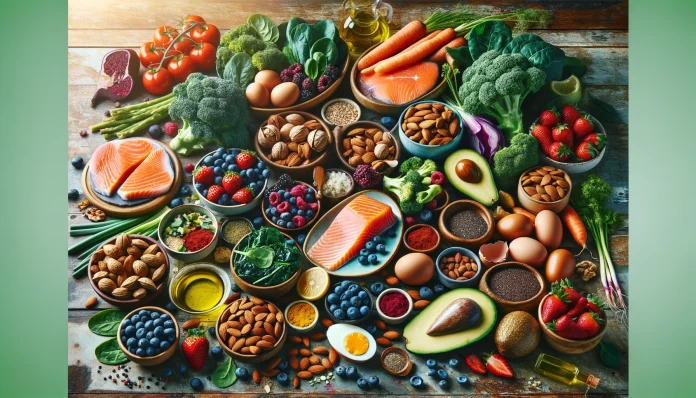In an era where health consciousness is more than a trend and has become a lifestyle, understanding the building blocks of a nutritious diet is paramount. Food, in its essence, is not just a source of pleasure but fuel for our bodies, influencing our health, mood, and longevity. Among the myriad of food options, certain categories stand out for their exceptional nutritional profiles. This article delves into the top 10 healthiest food categories, emphasizing the importance of each in achieving a balanced and vibrant diet.
Non-Starchy Vegetables: A Cornerstone of Nutrition
Non-starchy vegetables, including leafy greens like lettuce, spinach, and kale, along with broccoli, cauliflower, and Brussels sprouts, are foundational to any healthy diet. These vegetables are nutritional powerhouses, packed with vitamins, minerals, and fiber, yet low in carbohydrates. Their high nutrient density means they provide numerous health benefits while contributing minimal calories.
Berries: Nature’s Sweet Superfoods
Berries, such as strawberries, raspberries, blackberries, and blueberries, are celebrated for their low sugar content, high fiber, and concentration of essential vitamins. These sweet superfoods are rich in antioxidants, which combat oxidative stress and inflammation, underlying factors in many chronic diseases.
Animal Proteins: Quality Matters
The quality of animal proteins—meat from beef, pork, chicken, lamb, and fish like salmon, sardines, and mackerel—is crucial. Opting for proteins from animals raised on their natural diets enhances the nutritional value of the food, offering a better balance of omega-3 fatty acids, which are beneficial for heart health.
Eggs: Nature’s Multivitamin
Eggs, especially those from pasture-raised chickens, are often referred to as nature’s multivitamin because of their superior nutrient profile. They provide essential proteins, vitamins, and minerals, making them an excellent component of a healthy diet.
Fats and Oils: Selecting the Healthiest Options
Incorporating natural fats and minimally processed oils such as grass-fed butter, olive oil, coconut oil, and MCT oil into your diet can offer significant health benefits. These fats are necessary for brain health, energy production, and absorbing fat-soluble vitamins.
Nuts: Compact Nutritional Treasures
Nuts, including macadamia, pecans, walnuts, and almonds, are lauded for their low carbohydrate content and high levels of healthy fats and proteins. They’re also a convenient, nutrient-dense snack option that supports heart health and weight management.

Seeds: Small but Mighty
Seeds such as chia, flax, hemp, and pumpkin are recognized for their high fiber, healthy fats, and protein content. They’re versatile and can easily be incorporated into various dishes, enhancing their nutritional value.
Avocado: The Versatile Superfood
Avocado is not only versatile and delicious but also packed with healthy fats, particularly monounsaturated fat, which supports heart health. Its creamy texture and neutral flavor make it a fantastic addition to both sweet and savory dishes.
Tubers and Root Vegetables: Moderation is Key
Tubers and root vegetables, including yams, sweet potatoes, and carrots, are recommended for moderate consumption. They’re rich in vitamins, minerals, and antioxidants but should be balanced with individual carbohydrate tolerance in mind.
Herbs and Spices: Flavorful and Functional
Incorporating herbs and spices like garlic, ginger, turmeric, and others into your diet can provide micronutrients and health benefits beyond their culinary use. They have been shown to have anti-inflammatory, anti-bacterial, and antioxidant properties.
Conclusion
Adopting a diet rich in these top 10 healthiest food categories can significantly contribute to overall well-being. By focusing on nutrient-dense foods, individuals can enjoy a variety of flavors and textures while nurturing their bodies. Remember, the key to a balanced diet is diversity, so feel free to explore and incorporate these healthful foods into your meals in creative ways.
FAQs
- What makes non-starchy vegetables a crucial part of the diet? Non-starchy vegetables are low in calories and carbohydrates but high in vitamins, minerals, and fiber, making them essential for a balanced diet.
- Why are berries considered superfoods? Berries are rich in antioxidants, vitamins, and fiber, which contribute to heart health, improved digestion, and potentially lower risk of certain diseases.
- How does the quality of animal protein affect its nutritional value? Animal proteins from sources raised on natural diets tend to have a better nutrient profile, including a higher content of beneficial omega-3 fatty acids.
- Can fats be part of a healthy diet? Yes, natural fats and minimally processed oils are essential for brain health, energy production, and the absorption of vitamins.
- What are the benefits of incorporating seeds into the diet? Seeds are high in fiber, healthy fats, and protein, making them a nutritious addition to any meal.

